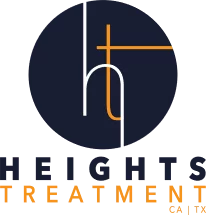Healing is Lifelong. It Can Begin Today.
Healing Is Lifelong. It Can Begin Today.
Addiction and mental health disorders can affect anyone of any age, gender, socioeconomic class, race, or background. These disorders can progress quickly, overshadowing anything and everything in your life, leaving you feeling like you have no autonomy over your own life.
Recovering from substance use disorders or mental illnesses on your own can be overwhelming. Seeking therapy to identify the root causes of these conditions and treat symptoms is key to overcoming them.
At The Heights Treatment, we offer comprehensive, holistic treatments for those suffering from substance abuse disorders or mental health concerns, including dialectical behavioral therapy.
Dialectical Behavioral Therapy can help you overcome addiction, harmful behaviors, and mental health disorders.
What Is DBT?
Dialectical Behavioral Therapy (DBT) is an offshoot of Cognitive Behavioral Therapy (CBT). The origins of DBT were to treat personality disorders and assist with interpersonal conflict, but evidence shows that this type of therapy is useful in treating mood disorders as well as addressing self-harm behavior such as substance use or suicidal ideations.
How Does DBT Work?
DBT focuses on mindfulness, emotional self-regulation, interpersonal effectiveness, and distress tolerance to help the individual improve self-acceptance while exploring the benefits of change.
In dialectical behavioral therapy, there are The Three Stages of Mind: Emotional Mind, Reasonable Mind, and Wise Mind. This concept explores the impact that each state of mind has on our thoughts, emotions, and actions, and encourages us to activate our Wise Mind to look at situations objectively, use mindfulness, and react in healthy ways.
Why is DBT Important to Recovery?
For those suffering from addiction or a mental health disorder, it is not uncommon to let interpersonal relationships deteriorate–even the one with ourselves. Dialectical behavioral therapy facilitates healthy relationships, communication skills, neuroplasticity, goal setting, self-acceptance, and stronger emotional regulation.
Overcome Substance Abuse & Mental Health Disorders at The Heights Treatment
At The Heights Treatment, we understand the complex relationship between mental health concerns, substance abuse disorders, and unresolved trauma connected to both.
At our facility, we take a multidisciplinary approach, using self-empowering modalities and the autonomy of outpatient care.
Our Levels of Care
Our therapy sessions are all outpatient-based, meaning that our clients are able to commit to recovery while still maintaining a level of autonomy that allows them to tend to work, school, and family obligations.
Our programming includes:
Individualized Intensive Program (IIP)
IIP is ideal for patients transitioning from a higher level of treatment or an inpatient program. This program offers evidence-based modalities and an integrative approach, but patients still have the flexibility to balance their recovery with responsibilities at work, home, or school.

Partial Hospitalization Program (PHP)
A PHP is an intensive level of outpatient care that’s ideal for patients transitioning from a residential treatment program or IIP. Patients still have the flexibility to tend to work, home, or school but benefit from a structured environment for treatment and care in our welcoming rehab center in Houston.

Intensive Outpatient Program (IOP)
Our IOP is a good fit for patients who have completed IIP or inpatient treatment but may need more rigorous care than an outpatient program. This program can help patients who have taken the first step toward recovery on their own and need more long-term support, treatment, and accountability.

Outpatient Program (OP)
Mental health treatment programs provide evidence-based behavioral health therapy and psychiatry. A positive community of peer support, family therapy sessions, and a compassionate staff with an individualized, strategic plan. Patients learn skills like positive awareness, coping skills, interpersonal effectiveness, and mindfulness in regular therapy sessions.

Holistic Modalities Mean Healing Every Part of You
Dialectical behavioral therapy is only part of the puzzle of your healing–you need to heal holistically.
Our therapeutic treatments empower the whole person–physically, emotionally, mentally, and spiritually. We use a combination of both individual and group therapy sessions that don’t just help you heal one-on-one, but create a support system and strong community with the same goals and challenges.
Our therapies include:

FAQs About DBT
Answers to some commonly asked questions about dialectical behavioral therapy:
How is DBT Different From CBT?
While the objective of both cognitive behavioral therapy (CBT) and dialectical behavioral therapy (DBT) are to help the client modify their thought patterns, there are significant differences. The primary emphasis of CBT is the relationship between thoughts and how to redirect them, whereas DBT focuses more on the relationship between acceptance and behavioral changes.
Is DBT a Form of Talk Therapy?
Yes, dialectical behavioral therapy is a form of talk psychotherapy that focuses on identifying thoughts and emotions, reducing one’s vulnerability to the emotional mind, developing mindfulness around emotions, and making conscious changes.
What are Examples of DBT Skills?
Dialectical behavioral therapy teaches the client skills that can be used outside of the treatment setting to prevent relapsing into drug use or negative behaviors. Some examples of DBT skills include:
- Increasing mindfulness during stressful situations
- Acceptance of emotions and thoughts as they arise
- Identifying and naming emotions
- Minimizing reactivity to strong emotions
- Identifying challenges to changing emotions and behaviors
- Challenging behaviors and emotions
Is DBT a Good Treatment for GAD, Panic Disorder, or Phobias?
Dialectical behavioral therapy is a common and effective modality in the treatment of anxiety disorders such as generalized anxiety disorder (GAD) and panic disorder. DBT helps clients regulate emotions. Those participating in DBT sessions learn to identify, accept and modify their reactions to unavoidable emotions.
Can DBT Help With Depression?
Many people suffering from depression find that dialectical behavioral therapy is effective when other treatments haven’t been. DBT takes a comprehensive approach to depression, combining behavioral, cognitive, and acceptance therapy to help the client develop coping skills.
Is DBT Used in the Treatment for OCD & Intrusive Thoughts?
Dialectical behavioral therapy is often used in the treatment of obsessive compulsive disorder (OCD) and intrusive thoughts. DBT helps clients identify emotions and manage automatic reactions to these emotions, improve self control, and regain a feeling of control in their lives.
Can DBT Help With ADHD?
DBT is one of the go-to treatments for those with ADD/ADHD. Dialectical behavioral therapy can help those with ADHD challenge impulsive behaviors and improve self-control.
What About Trauma & PTSD? Can DBT Help?
Yes. Dialectical behavioral therapy has been proven effective in treating the symptoms of post traumatic stress disorder (PTSD). Through mindfulness techniques, clients suffering from PTSD are able to focus on the present moment and stay grounded, as well as regulate emotions and increase distress tolerance.
Can DBT Help With Social Anxiety?
Social anxiety can be all-consuming, making it so that individuals don’t just find themselves struggling in traditional social situations, but even daily living tasks such as going to the grocery store. DBT can help those struggling with social anxiety overcome avoidant behaviors and learn how to react to stressors differently.
How Does DBT Help Psychosis and Schizophrenia?
Those suffering from psychotic symptoms can turn to dangerous behaviors. Dialectical behavioral therapy can help improve quality of life by helping the client learn grounding techniques that help when instances of delusions, discordant thinking, or agitation arise.
Can DBT Help With Eating Disorders?
The mindfulness skills one learns in dialectical behavioral therapy help those suffering from eating disorders feel more grounded and decrease compulsions surrounding food. This therapy is considered one of the most effective treatments when recovering from anorexia nervosa, bulimia nervosa, or binge eating disorder.
Can DBT Help With Feelings of Anger?
DBT has shown to be highly effective for clients dealing with feelings of anger. Because DBT focuses on identifying and naming negative emotions and then doing the opposite of what these emotions tell us to do, those experiencing lack of control over their anger responses learn how to ground themselves and change these reactive behaviors.
Can DBT Help With Bipolar?
Those suffering from bipolar disorders experience mood swings that can result in extreme dysfunction. Dialectical behavioral therapy can help with self-regulation and grounding, improving the quality of life for those with bipolar and other mood disorders.
Can DBT Help With Grief?
DBT helps clients stop ruminating on the past or worrying about the uncertainty of the future. This form of therapy involves taking the opposite action of what our emotions are telling us to do, and can help those experiencing deep grief move forward with their lives.
Does DBT Help Build Your Self-Esteem?
One of the biggest benefits of dialectical behavioral therapy is an improvement in self-esteem. Often, individuals with substance use disorders or mental health conditions can feel isolated and out of control of their thoughts, feelings, and subsequent behaviors. Regaining a sense of autonomy and self-empowerment can help increase self-esteem.
Is DBT Therapy Useful for IBS?
Those with IBS suffer an extreme level of distress which result in maladaptive coping strategies. Dialectical behavioral therapy can help manage these negative emotions and improve the symptoms of IBS.
Will DBT Help Me Manage Stress?
For people who are highly sensitive to their environments or highly reactive to their emotions, DBT can help with self-regulation and changing behaviors. Dialectical behavioral therapy is effective in stress management.
There is a Better Way to Live. Let Us Help You Find It. Start DBT Therapy in Houston & Los Angeles.
Substance abuse disorders and mental health conditions can leave a person feeling isolated, overwhelmed, and out of control of their own lives. It can be difficult to see the light at the end of the tunnel when it feels like the tunnel goes on forever. But there is help.
Dialectical behavioral therapy can help you take control of negative thoughts and behaviors that are controlling your mind and your life. At The Heights Treatment, we incorporate DBT into our holistic treatment options so that you can recover from drug addiction, mental health concerns, or dual diagnosis.
Call and speak with a member of our admissions team today and learn more about this life-changing therapy.


